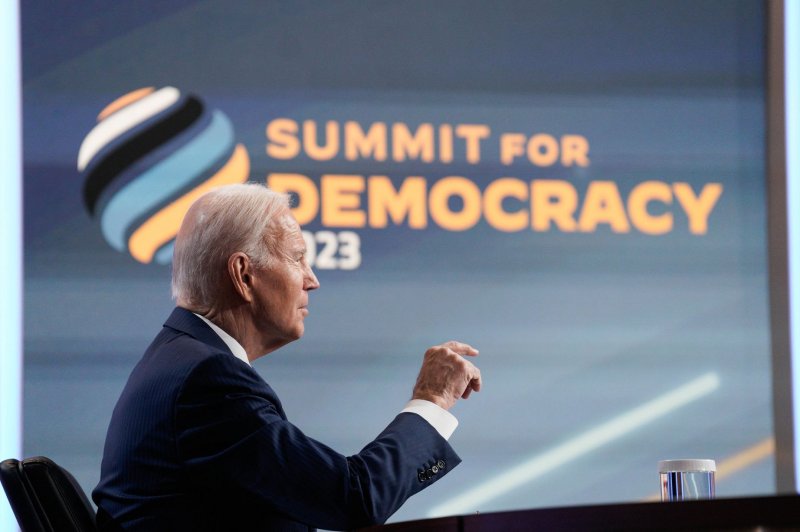1 of 6 | U.S. President Joe Biden speaks Wednesday during the Summit for Democracy Virtual Plenary, calling for "greater freedom, greater dignity and greater democracy" in remarks from the White House. Photo by Yuri Gripas/UPI |
License Photo
March 29 (UPI) -- President Joe Biden hosted world leaders virtually Wednesday as part of the second Summit for Democracy to "keep building on our progress" toward international partnerships and "boost democracy globally."
"This is a turning point for our world toward greater freedom, greater dignity and greater democracy," Biden said in remarks from the White House on Wednesday.
"Democracy demands full and equal participation of all -- all of our citizens," the president said. "That's how we unleash the human potential and put ourselves in the strongest possible position to take on the shared challenges -- and I emphasize 'shared' challenges."
The global meeting follows the first-ever event hosted by Biden in December of 2021, which brought together more than 100 governments, vowing to oppose authoritarianism and uphold human rights.
Biden kicked off Wednesday's meetings in which five co-host nations -- including Costa Rica, Netherlands, South Korea, and Zambia -- held hybrid regional virtual gatherings with dozens of leaders worldwide.
The representatives gave progress reports throughout the day on any actions taken on their pledges.
"Thank you for the work you've put in over the last 15 months to deliver on commitments. you made to each other and to our peoples for the first Summit -- from the first Summit of Democracy," Biden said as he opened his remarks Wednesday.
"When we gathered here in December of 2021, the sentiment in too many places around the world was that democracy's best days were behind us. Democracy had declined by some measures for 15 consecutive years. But this year, we can say there's a different story to tell," the president said.
"Today, we can say with pride, democracies of the world are getting stronger, not weaker," Biden said. "Autocracies of the world are getting weaker, not stronger. That's a direct result of all of us."
"We're bringing down the cost of essentials like prescription drugs and health insurance premiums. We're giving families a little bit more -- as my dad used to say, a little bit more breathing room," Biden added, saying there has been significant progress for working Americans.
"We're rebuilding America's infrastructure, driving innovation and tackling the climate crisis while -- all while creating good union jobs and investing in communities that too often have been left behind in the past," Biden added.
World leaders are also using the summit to address any emerging challenges in their respective states -- including disinformation, internal conflict, corruption, and influence by authoritarian rulers among many other political factors -- that "continue to erode democracy," the State Department said.
Biden addressed the topic during his morning session on the global challenges to democracy, announcing a coalition of international partners to regulate the use of commercial spyware.
"U.S. taxpayer dollars should not -- should not support companies that are willing to sell their products to abet human rights violations," Biden said.
"This effort is one of many -- many my administration is leading in the digital space for strengthening tools for Internet freedom; to better protecting activists and journalists from cyber threats, harassment, abuse; and -- shaping emerging technologies like artificial intelligence so that they deliver and develop things that are in line with our values," Biden said. Earlier this week, the president signed an executive order, restricting the U.S. government's use of commercial spyware tools.
Wednesday's session also included a speech by Ukrainian President Volodymyr Zelensky, who spoke about Russia's war on Ukraine and on democracy.
"Russia has been at war with all of you for a long time, with the democracies of the world," Zelensky said. "It fights via disinformation, election interference, espionage, corruption, exploiting, cyber crime, trying to trigger an energy crisis and price explosions in the market that will hit your people with insane electricity or gas bills," Zelenksy said.
Other notable speakers during the day included U.N. Secretary General Antonio Guterres, British Prime Minister Rishi Sunak, French President Emmanuel Macron, Japanese Prime Minister Fumio Kishida, and Israeli Prime Minister Benjamin Netanyahu.
South Korean President Yoon Suk-yeol will lead a session on economic growth and shared prosperity; Netherlands Prime Minister Mark Rutte will host a session about democracy in justice systems; Zambia President Hakainde Hichilema will host a session on delivering democracy through strong institutions; while Costa Rican President Rodrigo Chaves Robles will host a session about how democracy supports inclusion and equality.
A separate session is planned on advancing technology for democracy. The multi-day summit will officially close Thursday.
In a statement, the White House announced South Korea would host the next summit, while also recognizing the shared security goals between Washington and Seoul that are "rooted in our common democratic values and respect for human rights, and we are committed to further strengthening our robust political, economic, security, and people-to-people ties."
The summit is a key part of Biden's Presidential Initiative for Democratic Renewal, which the White House called a "landmark set of policy and foreign assistance initiatives" that build upon the U.S. government's "ongoing work to bolster democracy and defend human rights" around the world.
In December, Biden said the government will provide about $424 million to the program to focus on five "areas of work crucial to the functioning of transparent, accountable governance."
Among their objectives, member nations agreed to fight corruption, support free and independent media, bolster democratic reforms, advance technology, and defend free and fair elections.















